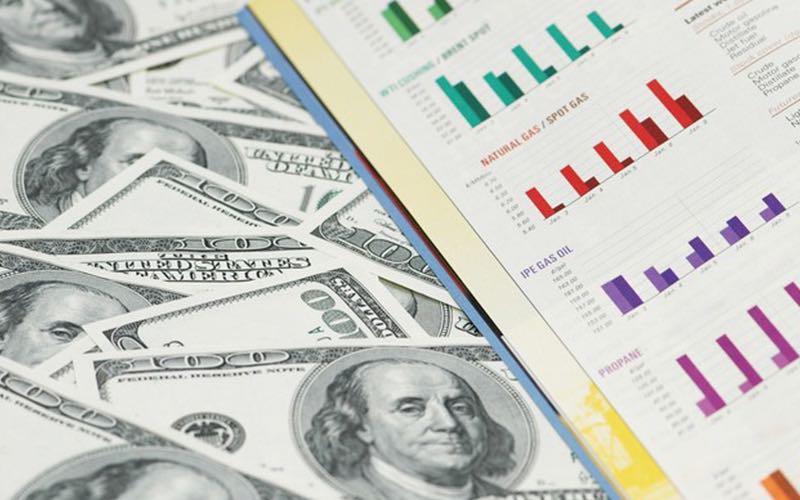Foreign exchange market weekly review: Political risks loom, the US dollar rises and then falls, and the yen and euro are in deep trouble
2025-10-11 21:05:44
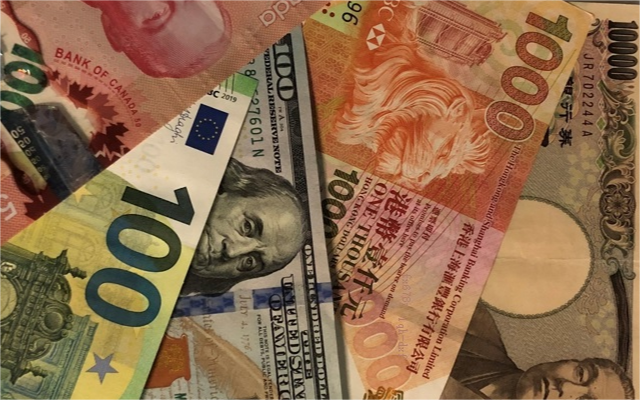
Looking ahead to next week, the market will continue to closely monitor political developments around the world. Whether the US government can break the deadlock, whether the delayed key inflation data can be released successfully, and the final statements from Federal Reserve officials before the blackout period will all determine the short-term direction of the US dollar. Furthermore, the clarity on Japan's new prime minister and the resolution of France's political situation will also be key variables influencing the yen and euro.
US dollar: Strong gains during the government shutdown, followed by a sharp pullback due to weekend trade concerns
This week's performance was marked by a series of twists and turns. From the beginning of the week to Thursday, the US dollar index climbed strongly, benefiting from significant weakness in the euro and yen. The index recorded its largest weekly gain since September 2024, rising 1.15% for the week and closing at 98.9750 on Friday. However, a sudden turn of events unfolded on Friday, with US President Trump again threatening to impose significant tariffs. Market concerns that escalating trade frictions would harm the US economy rapidly intensified, causing the US dollar index to plummet 0.55% that day, reversing nearly all of its weekly gains.
Key Events and Data The core factor that dominated the US dollar's performance this week was politics rather than economic data.
First, the US federal government shutdown entered its second week, yet the two parties have yet to make substantial progress. While the market initially reacted subtly, its negative impact has become apparent over time. Delays in the release of key economic data have become a major concern for the market. The non-farm payroll report, originally scheduled for early October, has been absent, and the timely release of next week's Consumer Price Index (CPI), Producer Price Index (PPI), and retail sales data is uncertain. While the US Bureau of Labor Statistics stated it is working diligently to compile the CPI report, tentatively scheduled for release on October 24, this has not completely allayed market concerns. The lack of data will undoubtedly pose a greater challenge to the Federal Reserve at its late October interest rate meeting.
Secondly, trade tensions have resurfaced. On Friday, President Trump's tariff rhetoric disrupted market calm. This move not only directly depressed the US dollar but also weighed on commodity-linked currencies like the Australian dollar. Markets are concerned that an escalation of the trade dispute will ultimately undermine US economic growth.
On the monetary policy front, despite the lack of data, market expectations for a Federal Reserve rate cut remain high. According to the Chicago Mercantile Exchange (CME) FedWatch tool, market participants are pricing in a 97% probability of a 25 basis point rate cut at the Fed's October meeting, and a 92% probability of another rate cut in December. However, since the September meeting, most Fed officials have not been overly dovish in their speeches, and ambiguous statements from some centrists appear intended to reduce the predictability of the October rate decision. With the quiet period before the Fed meeting on October 18th approaching, officials' speeches next week will be closely watched.
Institutional and analyst views
Juan Perez, head of trading at Monex USA in Washington, commented that Trump’s tariff threats “ultimately have a lot of negative impact on the U.S. economy” and raise many questions.
The market generally believes that the dollar's strength this week was partially due to the strong performance of the US stock market, which has alleviated investor concerns about the government shutdown. However, a sharp stock market correction could be a catalyst that forces Washington politicians to return to the negotiating table. Looking ahead, once the government shutdown is resolved, market focus may shift back to economic fundamentals. Investors may then begin to price in the possibility of weaker US economic data, putting pressure on the dollar.
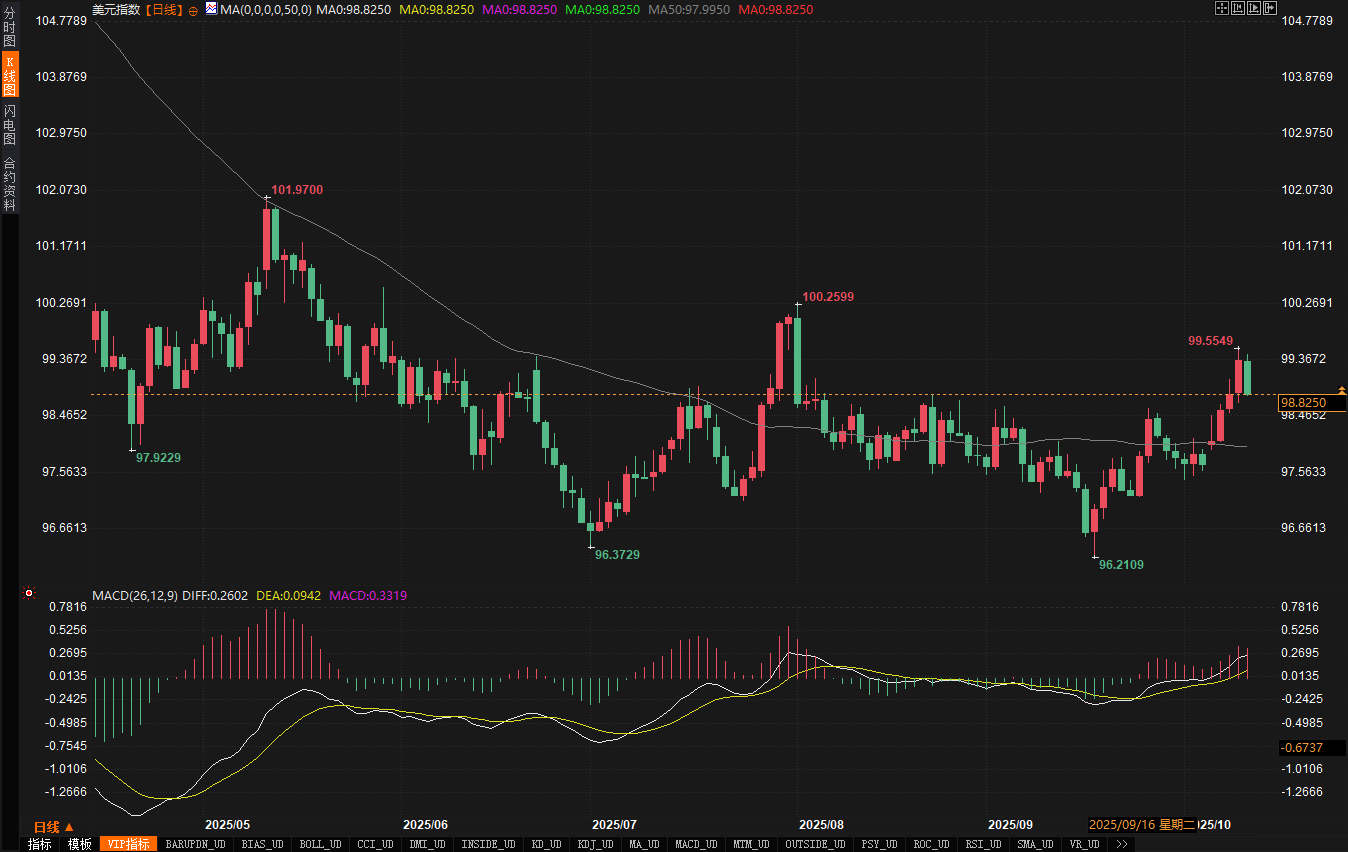
Yen: Political turmoil and fiscal concerns saw the yen suffer its biggest weekly drop in a year
The Japanese yen suffered a significant blow this week. The USD/JPY exchange rate surged as domestic political turmoil sparked deep concerns about future fiscal discipline and monetary policy. The USD/JPY exchange rate rose 2.51% this week, its largest weekly gain since September 2024. It closed at 151.157 on Friday, a significant drop from 147.44 the previous Friday.
Key Events and Data: Political changes in Japan are the root cause of the yen's sharp drop this week.
First, the unexpected election of fiscal dove Sanae Takaichi as president of the Liberal Democratic Party (LDP) took the market by surprise. Investors are concerned that under her leadership, the Japanese government may pursue a more accommodative fiscal policy, significantly reducing the likelihood of another Bank of Japan interest rate hike this year. Takaichi's statement on Thursday that any Bank of Japan decision must be consistent with government objectives further heightened market concerns about the potential erosion of the central bank's independence.
Secondly, the collapse of the 26-year ruling coalition between the Liberal Democratic Party and the Komeito Party has further complicated Japan's political landscape. Sanae Takaichi, originally scheduled to be voted in by the Diet on October 15th to become Japan's first female prime minister, is now likely to be postponed. She faces two options: either seek to form a new ruling coalition with other opposition parties, such as the Japan Restoration Party, or resign and allow the LDP to find a new leader who can repair relations with the Komeito Party. The extreme political uncertainty makes any action by the Bank of Japan at its October meeting unrealistic, although a December rate hike remains a possibility in the market.
Faced with the continued depreciation of the yen, Japanese officials have finally spoken out. Finance Minister Katsunobu Kato stated on Friday that the government will be wary of excessive volatility in the foreign exchange market. This marks the first verbal intervention by a Ministry of Finance official since the current round of yen depreciation.
Marc Chandler, chief market strategist at Bannockburn Global Forex in New York, noted that the Finance Minister's verbal intervention was a significant signal. He recalled that last year, Japanese officials expressed concern about the yen's depreciation of 10 yen within a month. If a similar depreciation were extrapolated from the September 17 low, the 155.5 level would likely become a red flag for the authorities.
Overall, Japan's economic outlook remains murky until a new prime minister is appointed and political stability is restored. Japan's Ministry of Finance and Bank of Japan will likely closely monitor the yen's downward momentum, but any real intervention will have to wait for clarity in the political situation.
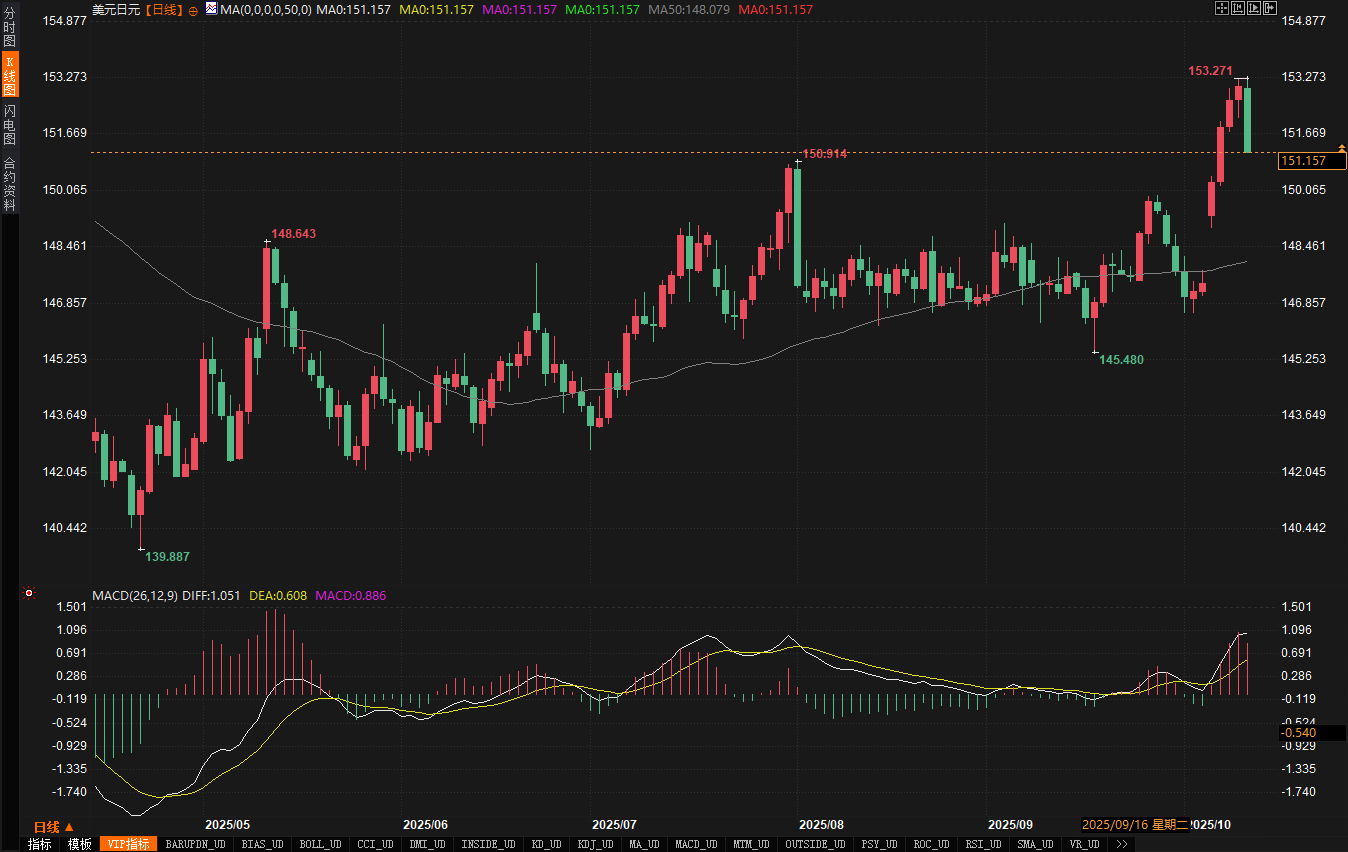
Euro: French political turmoil weighs on euro, posting its biggest weekly drop in three months
The euro also underperformed this week. Despite a 0.5% rebound on Friday, closing at 1.1622 against the dollar's pullback, the euro still suffered its biggest weekly drop against the dollar since July, falling 1.00%. The continued political turmoil in France was the primary drag on the euro.
Key Events and Data: France's political paralysis is currently a sore spot for the Eurozone. French President Emmanuel Macron's Friday evening deadline for appointing a new prime minister has passed, but he has yet to break the deadlock. The left-wing Popular Front and Marine Le Pen's National Rally hold key power in the National Assembly, making the appointment of any new prime minister extremely difficult.
The political crisis has had serious economic consequences. First, it has made it extremely challenging for the French government to pass an austerity budget aimed at reducing its massive deficit, leading to growing investor unease, reflected in rising French sovereign bond yields. Second, the political chaos is undermining economic growth, a fact the Bank of France governor has warned of.
To make matters worse, the eurozone's other major economic engines are also showing signs of fatigue. Data from countries such as Germany show that economic growth momentum is slowing, which makes the outlook for the entire eurozone even bleaker.
"The German data was not good, so I think that makes the euro more vulnerable to the French news," said Jane Foley, chief strategist at Rabobank.
The market believes that the euro will remain under pressure until a credible solution is found to France's political deadlock. Early parliamentary elections currently appear unlikely, as polls suggest the two main opposition parties will maintain their dominance. Therefore, some believe that President Macron may ultimately be forced to call a snap presidential election in 2026 to break the deadlock, but this remains a distant prospect.
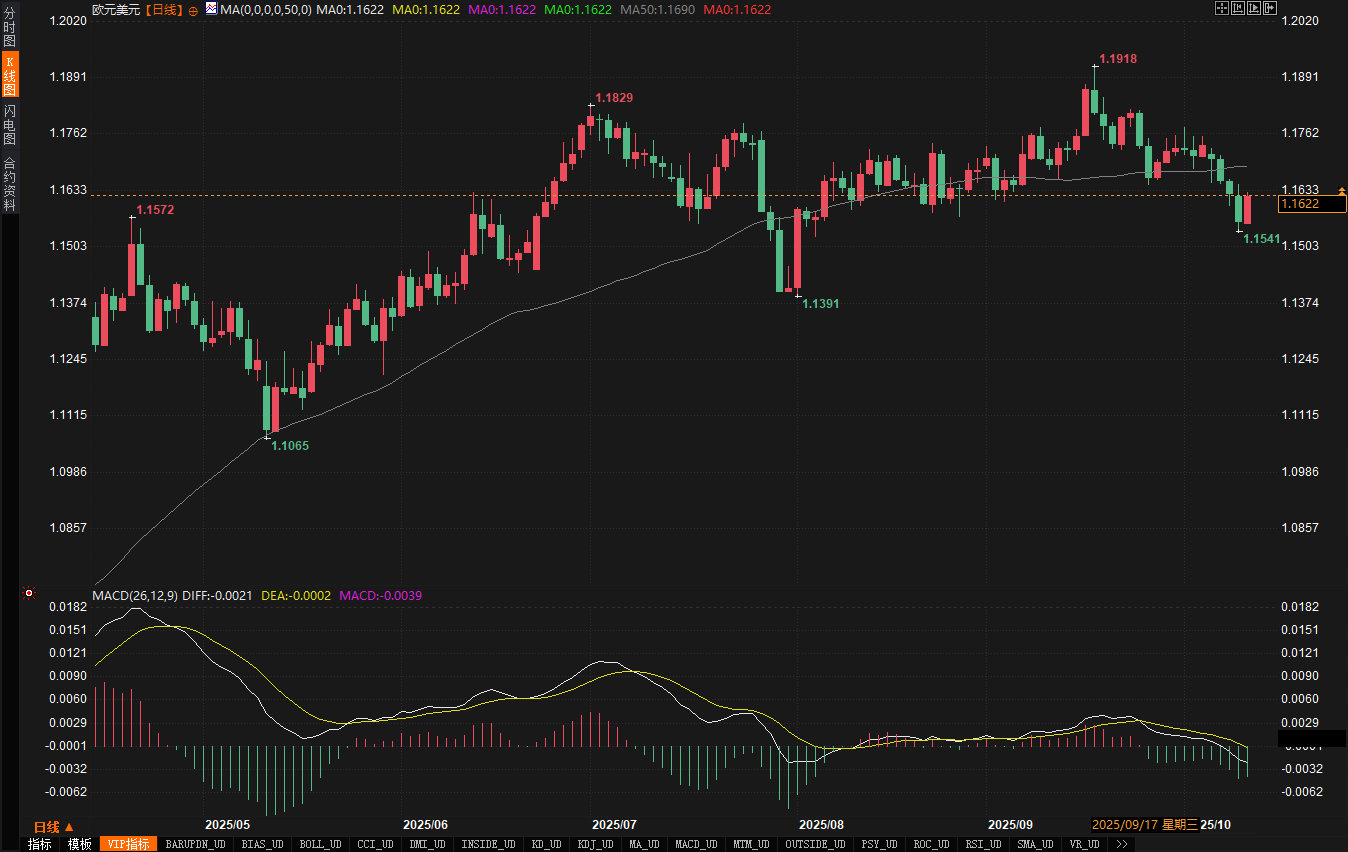
Outlook for next week
Looking ahead to the next week, political factors will continue to be the main force affecting market nerves.
In the United States, negotiations to end the government shutdown will be a top priority. Furthermore, the release date and details of delayed inflation data, such as the September CPI, will provide key clues for the market's judgment of the Federal Reserve's next move. Federal Reserve officials' final speeches before the quiet period on October 18th could also trigger market volatility.
In Asia, whether Japan's Liberal Democratic Party can successfully form a new government will directly impact the fate of the yen. In Europe, the outcome of the French prime ministerial race will determine whether the euro can temporarily find a respite. Furthermore, key UK labor market data will be released next week. Given the widespread market expectation that the Bank of England will remain on hold in November, this data could provide new trading guidance for the British pound.
In short, the global foreign exchange market is in a sensitive period driven by political risks. Investors need to remain highly vigilant to all kinds of political news, as any unexpected developments may change the direction and rhythm of the market in an instant.
- Risk Warning and Disclaimer
- The market involves risk, and trading may not be suitable for all investors. This article is for reference only and does not constitute personal investment advice, nor does it take into account certain users’ specific investment objectives, financial situation, or other needs. Any investment decisions made based on this information are at your own risk.




















